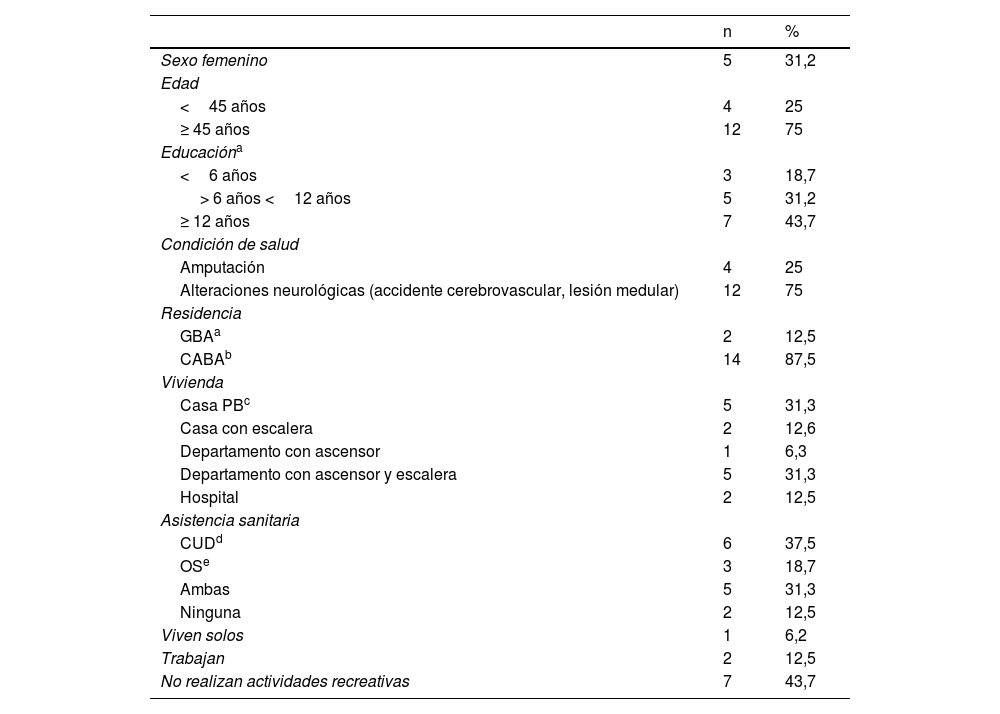La Organización Mundial de la Salud declaró a la infección por COrona VIrus Disease 19 (COVID-19) como pandemia y recomendó, como medida preventiva, el distanciamiento social. Esto afectó a todos los tratamientos médico-clínicos, incluidos los relacionados con el proceso de rehabilitación física. El objetivo fue describir las percepciones sobre el proceso de rehabilitación debido a las modificaciones experimentadas por las personas con discapacidad motora de un hospital de rehabilitación durante la pandemia por COVID-19.
Pacientes y métodosDiseño cualitativo. La muestra elegida fue por conveniencia y el análisis de datos fue por análisis temático, el cual permite identificar, analizar y reportar temas relevantes. Las entrevistas se realizaron a pacientes atendidos en la División de Kinesiología. Criterios de inclusión: adultos> 18 años, diagnóstico de discapacidad motora, en tratamiento kinésico ≥ 1 mes de forma ambulatoria, con alta temprana de internación o internados en el momento de la realización del estudio y firma del consentimiento informado. Criterios de exclusión: alta kinésica por motivos diferentes a la COVID-19 y diagnóstico de enfermedad psiquiátrica.
ResultadosLa muestra se compuso de 16 participantes. El 31,2% era de sexo femenino. Doce presentaron diversas alteraciones neurológicas y 4, secuelas de amputación. Se identificaron 4 temas principales: importancia de la rehabilitación, modificaciones/interrupción del tratamiento, actividades de la vida diaria y telerrehabilitación.
ConclusionesSe describieron las percepciones sobre el proceso de rehabilitación y el impacto en las modificaciones experimentadas en las personas con discapacidad motora. Destacamos la importancia de la telerrehabilitación como un recurso alternativo.
The World Health Organization declared COrona VIrus Disease 19 (COVID-19) a pandemic and recommended social distancing as a preventive measure. This affected all medical–clinical treatments, including those related to the physical rehabilitation process. The objective was to describe the perceptions about the rehabilitation process due to the modifications experienced by people with motor disabilities in a rehabilitation hospital during the COVID-19 pandemic.
Patients and methodsQualitative design. The sample chosen was for convenience and the data analysis was by thematic analysis, which allows to identify, analyze and report themes. The interviews were conducted with patients seen in the physiotherapy división of the hospital. Inclusion criteria: adults >18 years old, diagnosis of motor disability, undergoing physical treatment ≥1 month on an outpatient basis, with early discharge from hospitalization or hospitalization at the time of the study and signing of the informed consent. Exclusion criteria: physical discharge for reasons other than COVID-19 and diagnosis of psychiatric illness.
ResultsThe sample consisted of 16 participants. 31.2% were female. Twelve presented various neurological alterations and 4 amputation effects. Four main themes were identified: importance of rehabilitation, treatment modifications/interruption, activities of daily living and tele-rehabilitation.
ConclusionsPerceptions about the rehabilitation process and the impact on the modifications experienced in people with motor disabilities were described. We highlight the importance of tele-rehabilitation as an alternative resource.








